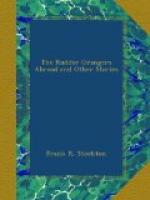“Now,” she said, with a pretty smile, “let me do the talking. Don’t look so downcast. When I tell you that you have made me very, very happy, you should look happy too. When you came to me yesterday, and said what you said, I thought you were in too much of a hurry; but now I think that perhaps you were right, and that when people of our age have anything important to do it is well to do it at once; for in this world there are all sorts of things continually springing up to prevent people from being happy.”
The whole body of the baker was filled with a great groan, but he denied it utterance. He must hear what she would say.
“And so I was going to suggest,” she continued, “that instead of skipping Christmas together, we keep it together. That is all the change I propose to your plan.”
Up sprang the baker, so suddenly, that he overset his chair. Now he must speak. The widow stepped quickly toward the door, and, turning with a smile, held up her hand.
“Now, good friend,” said she, “stop there! At any moment some one might come in. Hasten back to your shop. At three o’clock I will meet you at the parson’s. That will surely be soon enough, even for such a hasty man as you.”
The baker came forward, and gasped, “Your husband!”
“Not yet,” said the widow, with a laugh, and, kissing the tips of her fingers to him, she closed the door behind her.
Out into the cold went the baker. His head was dazed, but he walked steadfastly to his shop. There was no need for him to go anywhere; to tell anybody anything. The man with the earrings would settle matters for himself soon enough.
The baker put up his shutters and locked his shop door. He would do nothing more for the good of trade; nothing more for the good of anything. Skip Christmas! Indeed would he! And, moreover, every holiday and every happy day would now be skipped straight on for the rest of his life. He put his house in order; he arranged his affairs; he attired himself in his best apparel; locked his door behind him; and went out into the cold world.
He longed now to get far away from the village. Before the sun set there would not be one soul there who would care for him.
As he hurried on, he saw before him the parson’s house.
“I will take but one thing away with me,” he said; “I will ask the good old man to give me his blessing. That will I take with me.”
“Of course he is in,” said the parson’s maid; “there, in the parlor.”
As the baker entered the parson’s parlor, some one hastened to meet him. It was the Widow Monk.
“You wicked man,” she whispered, “you are a quarter of an hour late. The parson is waiting.”
The parson was a little man with white hair. He stepped toward the couple standing together, and the widow took the baker’s hand. Then the parson began the little speech he always made on such occasions. It was full of good sense and very touching, and the widow’s eyes were dim with tears. The baker would have spoken, but he had never interrupted a clergyman, and he could not do it now.




